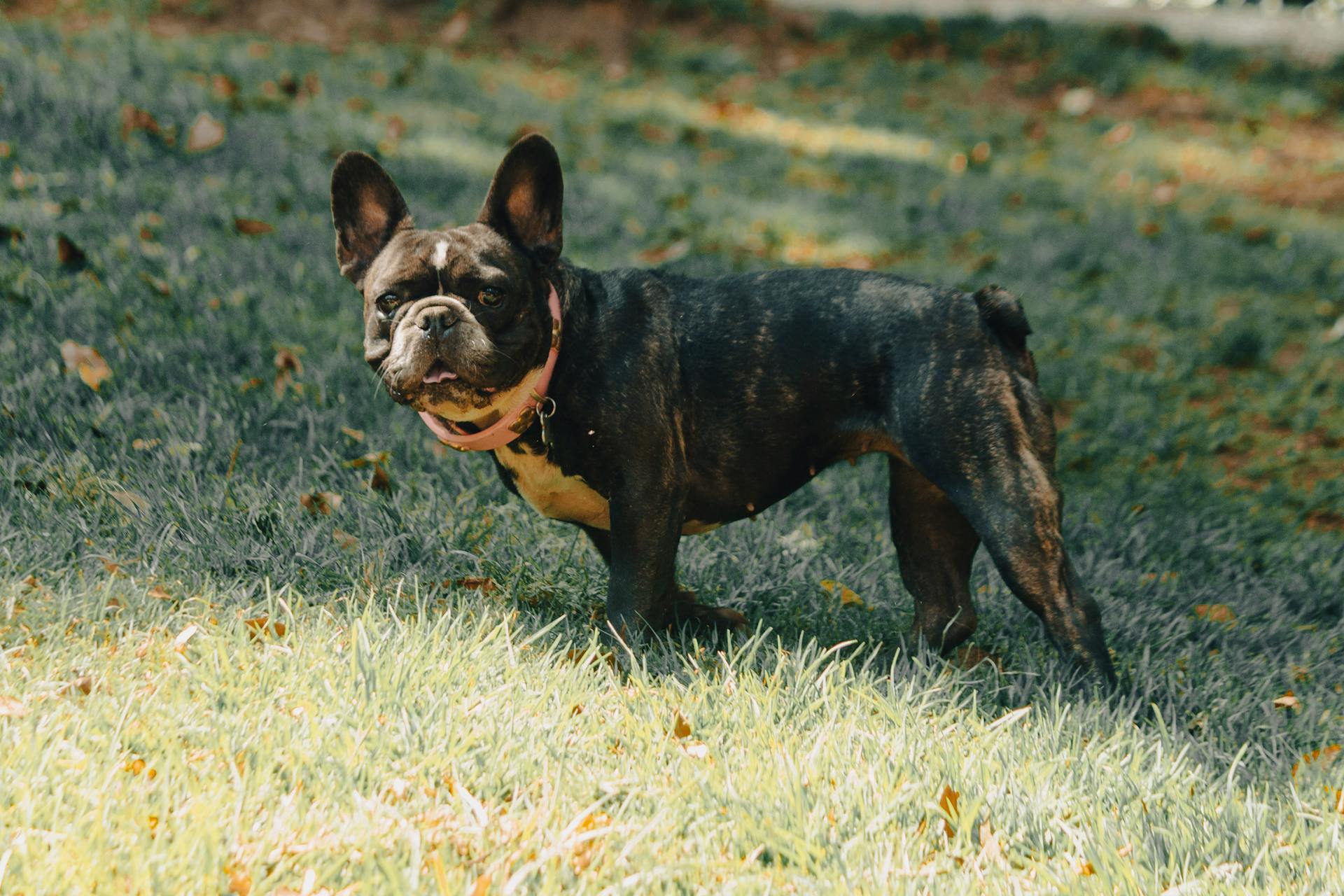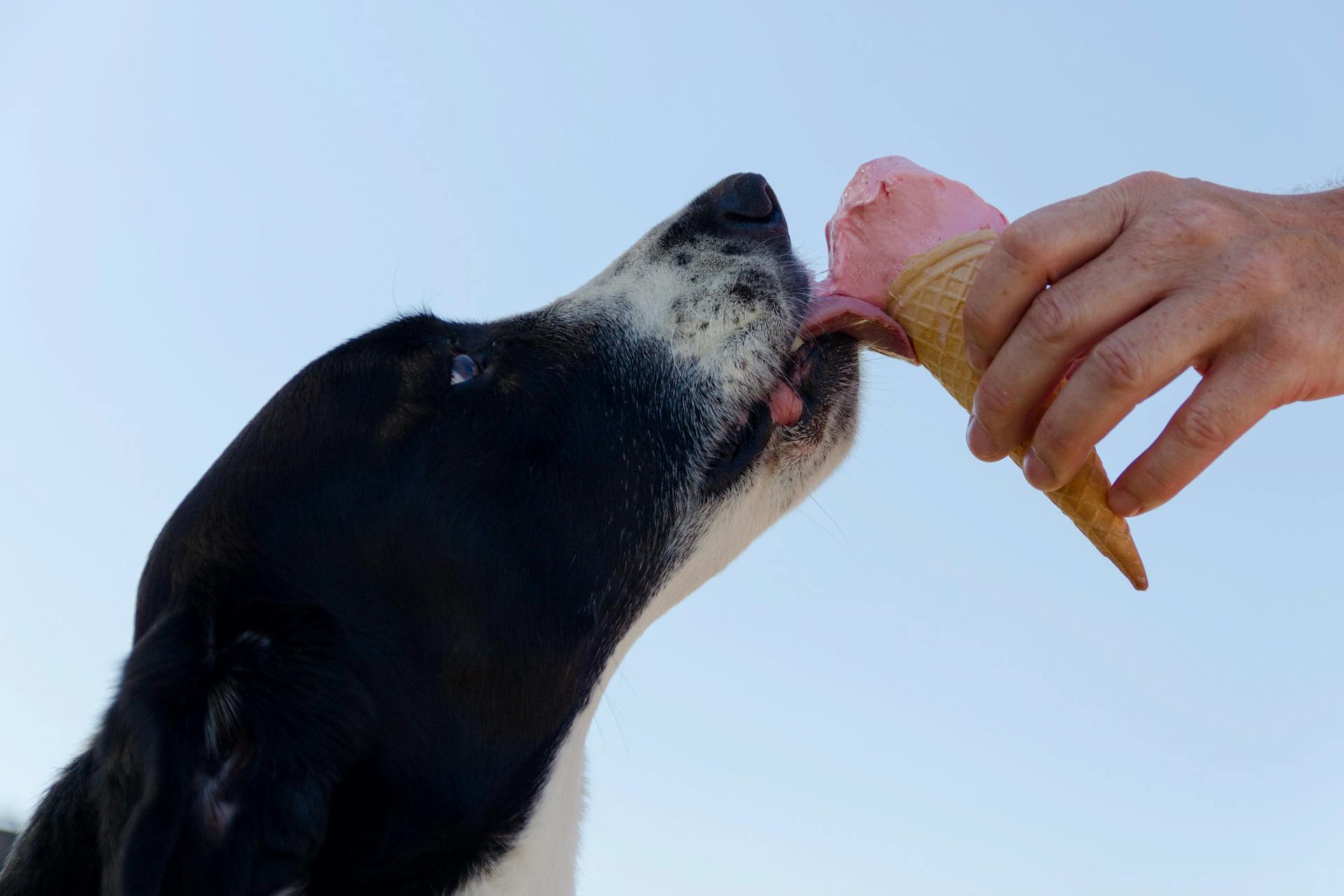
French Bulldogs can breathe fast, and it's not uncommon for them to do so. Their short, flat face can make breathing a bit more challenging.
French Bulldogs are brachycephalic, which means their airways are shorter and narrower than those of other breeds. This can lead to breathing difficulties, especially in hot or humid weather.
Breathing fast is one of the signs of brachycephalic syndrome, a common condition in French Bulldogs. If you notice your French Bulldog breathing fast, it's essential to monitor their behavior and watch for other symptoms.
A French Bulldog breathing fast may also be a sign that they're overheating or experiencing stress.
Intriguing read: English Bulldog Breathing Problems
Understanding French Bulldog Health
French Bulldogs are prone to breathing difficulties due to their brachycephalic nature, characterized by flat faces and short noses. This physical trait compresses their airways, making breathing less efficient.
The respiratory system of French Bulldogs can be compromised, leading to overheating and respiratory stress. Owners must ensure a comfortable environment and monitor exercise to prevent respiratory distress.
Suggestion: Shih Tzu Breathing Fast
Rapid breathing in French Bulldogs can be a sign of distress or discomfort, and it's essential to monitor for accompanying symptoms like coughing, wheezing, or nasal discharge.
Here are some key factors to consider when evaluating your Frenchie's breathing:
- Rapid breathing persists for an extended period without apparent reason.
- Accompanied by symptoms like coughing, wheezing, or nasal discharge.
- Exhibiting signs of distress or discomfort during fast breathing episodes.
- The occurrence of blue or pale gums indicating oxygen deprivation.
- Fast breathing is associated with lethargy or unusual inactivity.
- Exhibiting signs of dehydration or overheating along with rapid breathing.
- The onset of fast breathing after potential exposure to allergens or toxins.
- Behavioral changes such as anxiety or restlessness accompany the increased breathing rate.
- A notable decrease in appetite or refusal to eat while experiencing fast breathing.
- Occurrence after exertion or exercise doesn’t normalize after rest.
Canine Panting Physiology
Dogs rely heavily on panting to cool down, unlike humans who regulate their body temperature through sweating.
Rapid breathing allows them to expel heat by evaporating water from the mouth, tongue, and upper respiratory tract.
Panting also plays a crucial role in a dog's emotional expression, serving as a release valve for heightened emotional states.
Notice how your furry friend pants during a thrilling game of fetch or during a stressful vet visit? That's because panting can also be a response to excitement, stress, or fear.
Each breath in brings new scents, enhancing their sense of smell—a critical aspect of your dog’s interaction with the world.
Here are some signs that your French Bulldog's panting might be more than just normal:
For another approach, see: National Dog Show French Bulldog 2023
Breed-Specific Patterns
French Bulldogs are prone to breathing difficulties due to their brachycephalic syndrome, which means their short snouts can cause faster, more labored breathing.
These breathing patterns can worsen over time, especially in breeds like French Bulldogs, so it's essential to monitor their symptoms closely.
Their brachycephalic syndrome puts them at a higher risk for respiratory complications, making regular check-ups with a veterinarian crucial.
Curious to learn more? Check out: Fish Breathing Fast
Normal vs. Abnormal
Normal fast breathing in French Bulldogs is common after vigorous play, during the hot days of summer, or when your dog is overexcited. This type of panting is generally short-lived and it disappears as the dog cools down or calms down.
Older dogs tend not to breathe rapidly for extended periods in their sleep, though. This is a good thing, as it could indicate a decline in their overall health.
Your Frenchie may use more energy during the REM sleep cycle, leading to rapid breathing. This is a normal part of the sleep cycle, but longer durations can be a red flag.
Curious to learn more? Check out: National Dog Show French Bulldog
Abnormal panting appears more labored and might indicate underlying health issues. Recognizing these differences allows you to respond appropriately, whether it means offering a cool drink of water and rest or seeking veterinary care.
If your French Bulldog's panting becomes excessive without a clear reason, or if it's accompanied by additional symptoms such as lethargy, coughing, or an inability to settle, it's time to pay attention.
Intriguing read: English Bulldog Panting
Common Health Issues
Fast breathing in French Bulldogs can be a red flag, signalling everything from temporary stress to serious health conditions.
Brachycephalic Syndrome is a common health issue in French Bulldogs, characterized by a flat face and short nose, which can lead to respiratory difficulties.
Narrowed airways and a compressed respiratory system result in faster breathing, especially during sleep when the body is relaxed.
French Bulldogs, like any other dog, can suffer from brachycephalic airway syndrome, which is exacerbated by exercise, heat, and obesity.
Snoring and difficulty breathing are two common signs of a French Bulldog suffering from brachycephalic airway syndrome.
Exercising your Frenchie, getting them excited, or being in hot weather can exacerbate these symptoms.
Being overweight can make your French Bulldog suffer more from brachycephalic airway syndrome.
French Bulldogs may not enjoy exercising, and may even have episodes of collapsing or show blue tongues and gums due to lack of oxygen, a condition called cyanosis.
Your Frenchie will most likely be just reacting to a dream excitement or exercise at the end of the day, but it's always best to be vigilant and see your Vet as soon as possible if you have any doubts.
Identifying and Addressing Problems
Identifying the cause of fast breathing in French Bulldogs is crucial to addressing the problem. Determining the underlying cause can be aided by observing accompanying symptoms and situations leading to fast breathing. Veterinary consultation can also aid in pinpointing the exact issue.
Pay attention to breathing noises, such as heavy panting or snoring, which can be symptoms of breathing distress. Be alert to exaggerated and desperate breathing noises during exercise, and look for signs of oxygen deficiency, such as blue gums and tongue.
Here are some common causes of fast breathing in French Bulldogs:
- Pain or discomfort, which can be due to injuries, inflammation, or diseases
- Respiratory stress due to their brachycephalic nature, making breathing less efficient than breeds with longer snouts
- Overheating and dehydration, which can be caused by a comfortable environment and exercise
- Underlying health conditions, such as allergies or toxins
Identifying Problem Signs
Fast breathing in French Bulldogs can be a sign of underlying issues, and it's essential to pay attention to the accompanying symptoms and situations.
Pay attention to breathing noises, as heavy panting, even at rest, and snoring when the dog is asleep, can be symptoms of breathing distress.
Be alert to signs of oxygen deficiency, which can result in gums and tongue turning blue in extreme cases.
Dehydration can cause a French Bulldog to breathe faster, so ensure your dog has access to fresh water, especially in hot weather.
Stress or anxiety can also lead to fast breathing, with signs including fast, shallow breaths and whining or pacing.
Additional reading: Dog Food for French Bulldogs with Allergies

Heat stress is a common issue for French Bulldogs, and excessive heat can lead to rapid breathing as their bodies attempt to cool down.
Monitor your Frenchie's breathing patterns closely, adjusting care and management strategies as needed.
Here are some common signs of breathing problems in French Bulldogs:
- Heavy panting, even at rest
- Snoring when the dog is asleep
- Blue or pale gums indicating oxygen deprivation
- Coughing, wheezing, or nasal discharge
- Exhibiting signs of distress or discomfort during fast breathing episodes
- Dehydration or overheating along with rapid breathing
- Behavioral changes such as anxiety or restlessness
- Notable decrease in appetite or refusal to eat while experiencing fast breathing
- Occurrence after exertion or exercise doesn’t normalize after rest
Pain or Discomfort
Dogs in pain may breathe rapidly as a response to discomfort.
This can be due to various factors, such as injuries, inflammation, or diseases.
Reluctance to move is another common sign of pain in dogs.
Decreased appetite can also be a sign of discomfort or pain in dogs.
Paying close attention to your dog's behavior and physical condition can help you identify potential issues.
A different take: Are French Bulldogs Good Apartment Dogs
Consult a Veterinarian
If you're concerned about your French Bulldog's breathing, it's essential to consult a veterinarian as soon as possible.
Don't wait for symptoms to escalate, as early intervention can be life-saving, especially in cases of suspected poisoning, severe allergic reactions, or any abrupt onset of fast, labored breathing.
Prompt action combined with professional veterinary intervention can make all the difference in your dog's health and recovery trajectory.
If you observe signs of heatstroke or any distressing respiratory symptoms, immediate veterinary attention is needed.
Causes of Rapid Breathing
Rapid breathing in French Bulldogs can be caused by a variety of factors, including their brachycephalic nature, which leads to compressed airways and makes breathing less efficient.
Their flat faces and short noses can lead to overheating and respiratory stress, especially in hot or humid environments.
Respiratory infections, such as coughing, wheezing, and nasal discharge, can also cause rapid breathing in French Bulldogs.
Asthma can cause inflamed airways, leading to rapid breathing, and managing the environment to minimize triggers is crucial.
French Bulldogs may also breathe rapidly due to temporary stress or anxiety, but this should not be a cause for concern if it's short-lived.
Understanding Bulldog Respiratory System
Bulldogs, like French Bulldogs, have a unique respiratory system due to their brachycephalic nature. This means they have flat faces and short noses, leading to compressed airways.
Their anatomy makes breathing less efficient compared to breeds with longer snouts. Owners must ensure a comfortable environment and monitor exercise to prevent respiratory distress.
Fast breathing in Bulldogs can be a red flag, signalling everything from temporary stress to serious health conditions. It's essential to understand the underlying causes to provide proper care.
Their brachycephalic nature can lead to overheating and respiratory stress. This is especially true for French Bulldogs, who are prone to these issues.
Asthmatic Bulldogs may exhibit rapid breathing due to inflamed airways. Managing the environment to minimize triggers and seeking medical care is vital.
Understanding the unique respiratory system of Bulldogs can help you identify potential issues. By being aware of these factors, you can take steps to prevent respiratory distress and ensure your Bulldog stays healthy.
Why Is My Bulldog Breathing Heavily?
If your bulldog is breathing heavily, it's essential to identify the underlying cause. Observing accompanying symptoms and situations leading to fast breathing is crucial.
Rapid breathing in bulldogs can be a red flag, signalling everything from temporary stress to serious health conditions. Common causes include respiratory infections, asthma, and heat stress.
Respiratory infections can lead to rapid breathing in bulldogs. Symptoms like coughing, wheezing, nasal discharge, and fast breathing require immediate veterinary attention to diagnose and treat the infection.
Monitor your bulldog's breathing patterns during rest, as a significant change in their normal respiratory rate can serve as an early warning system for underlying issues. A notable decrease in appetite or refusal to eat while experiencing fast breathing is also a concern.
Here are some signs that may indicate your bulldog is experiencing heat stress:
- Fast breathing due to excessive heat
- Overheating
- Respiratory distress
French Bulldogs are prone to overheating and respiratory stress due to their brachycephalic nature. Ensuring a comfortable environment and monitoring exercise can prevent respiratory distress.
If your bulldog is experiencing rapid breathing, it's best to consult a veterinarian to determine the underlying cause.
Recognizing and Managing Symptoms
French bulldogs can be prone to breathing fast, especially during sleep, and it's essential to recognize the signs. A significant change in their normal resting respiratory rate can serve as an early warning system.
Monitoring your French bulldog's breathing patterns during these quiet moments is crucial, as it can be a subtle but important sign that it might be time to pay your vet a visit.
Fast breathing in resting adult dogs can sometimes point to deeper health issues, such as respiratory or cardiovascular conditions, unlike puppies where it's usually harmless and part of their developmental process.
A rapid breath in adult dogs can indicate that their body is working harder to ensure adequate oxygen flow.
Sources
- https://pudgybulls.com/do-french-bulldogs-breathe-fast-while-sleeping/
- https://colaskitchen.com/blog-posts/why-is-my-dog-breathing-fast
- https://littlefrenchdog.com/why-is-my-french-bulldog-breathing-so-fast/
- https://www.frenchie.shop/blogs/frenchie-shop-blog/why-is-my-french-bulldog-breathing-so-fast
- https://www.wikihow.com/Treat-Breathing-Problems-in-French-Bulldogs
Featured Images: pexels.com


